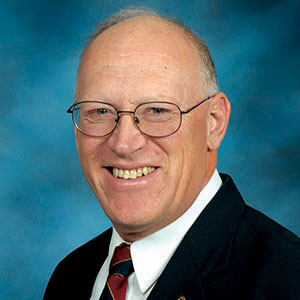Kansas Profile – Now That’s Rural: Annie Yungeberg, remote work
At a glance: Annie Yungeberg is a teacher in Washington, Kansas who recently learned of a business that was doing online media monitoring, analysis and summarization. Now she performs that work remotely on her own time from home, serving national and international clients.
More information: Ron Wilson, rwilson@ksu.edu, 785-532-7690
Photos: Ron Wilson | Annie Yungeberg
Website: Huck Boyd National Institute for Rural Development
Jan. 17, 2024

By Ron Wilson, director of the Huck Boyd National Institute for Rural Development at Kansas State University
The Spanish-language version of a report goes to a business in Venezuela, while the English version reaches corporate executives in Houston.
This analytical report came not from corporate headquarters, but from a researcher who is working remotely in rural Kansas. Remote work opportunities have enabled this entrepreneurial, tech-savvy woman to perform her job from home.
![]() Annie Yungeberg is a media researcher and remote worker based in Washington, Kansas. She grew up in Holton and studied psychology at the University of Kansas. She found she enjoyed writing and editing.
Annie Yungeberg is a media researcher and remote worker based in Washington, Kansas. She grew up in Holton and studied psychology at the University of Kansas. She found she enjoyed writing and editing.
At right: Annie Yungeberg | Download this photo
Annie met her husband, James Yungeberg, through the local music scene, and the couple later moved to Washington.
James Yungeberg is now director of environmental sciences for Washington County. That office is responsible for the noxious weed department, solid waste and household hazardous waste programs. As an example of innovative regional partnerships, Washington County also provides recycling services for neighboring rural counties and even in Nebraska.
Annie and James have a daughter and son. Annie worked for a time as an ad designer for the local newspaper, the Washington County News. She also earned a master’s degree and teaching certificate online through Fort Hays State University. She is now the lead teacher in the USD 108 preschool.
Through a cousin, Yungeberg learned about an online business that had been created by some K-State graduates. The business conducted online media monitoring. Yungeberg worked for the company as it went through changes in ownership. Several former employees then came together to form Watershed Analytics, which Yungeberg works for today.
Annie Yungeberg now teaches at the school and performs her research as a remote worker from home. Her primary clients come from the oil and gas industry.
As a media researcher, she scans relevant print and broadcast media coverage of the oil and gas industry and prepares daily and monthly reports. This includes summarization, analysis, and coding. Using Google Translate, she also prepares a Spanish-language version for a South American client. Her work is done entirely remotely.
In 2023, Yungeberg received a scholarship made possible by a NetWorked Community Solutions Grant to the North Central Regional Planning Commission. The scholarship was for her to take the K-State/Utah State Remote Online Initiative course that offers training and certification for remote workers.
This is a one-month online course consisting of nine modules and four interactive workshops. The modules cover such topics as organizing a remote worksite, planning a workday, project tracking, online communication, compliance, productivity, teamwork, time management, cybersecurity, critical thinking and more.
Yungeberg values the flexibility of remote work and family time. Their daughter is 14 and their son is 11. “Working part-time outside the home is tough with kids,” Yungeberg said.
“I like that I can get another source of income and I don’t have to leave my house,” Yungeberg said. “If we have a busy night, I can stay up late to finish my work if I need to.”
Broadband access is fundamental if remote work is to be implemented successfully. Yungeberg’s home is served by the rural telecom company, Blue Valley Technologies. Blue Valley is one of the companies that has earned the Smart Rural Community designation from NTCA, the national rural broadband association.
Remote work makes it possible for Yungeberg to connect with distant customers while enjoying a rural lifestyle. “There’s a lot to love about rural life,” Yungeberg said. “I can see the sun rise and set from my community.If my kids go missing, they are returned to me. The crime rate is low.”
“People here take care of each other.”
That’s good to hear about a rural community such as Washington, population 1,071 people. Now, that’s rural.
The corporate executives in Texas and Venezuela have received their daily report. This data doesn’t come from the 14th floor of a company’s corporate headquarters, but rather was prepared by an analyst working remotely from small-town Kansas.
We commend Annie Yungeberg for making a difference by utilizing technology to create business opportunities in a rural setting. Do I think this way of working is going away? Not a remote chance.
Audio and text files of Kansas Profiles are available at http://www.kansasprofile.com. For more information about the Huck Boyd Institute, interested persons can visit http://www.huckboydinstitute.org.
***

K‑State Research and Extension is a short name for the Kansas State University Agricultural Experiment Station and Cooperative Extension Service, a program designed to generate and distribute useful knowledge for the well‑being of Kansans. Supported by county, state, federal and private funds, the program has county extension offices, experiment fields, area extension offices and regional research centers statewide. Its headquarters is on the K‑State campus in Manhattan. For more information, visit www.ksre.ksu.edu. K-State Research and Extension is an equal opportunity provider and employer.